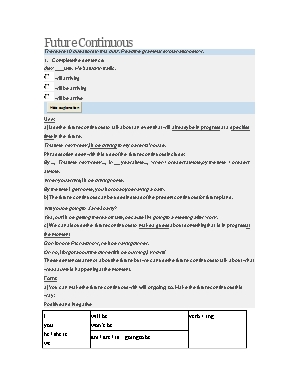Ngữ pháp môn Tiếng Anh Lớp 10 - Future Continuous
Bạn đang xem tài liệu "Ngữ pháp môn Tiếng Anh Lớp 10 - Future Continuous", để tải tài liệu gốc về máy bạn click vào nút DOWNLOAD ở trên

Future Continuous There are 10 questions in this quiz. Read the grammar explanation below. 1. Complete the sentence. Alex ___ late. He’s stuck in traffic. Top of Form will arriving will be arriving will be arrive Bottom of Form Use: a) Use the future continuous to talk about an event that will already be in progress at a specified time in the future. This time next week, I’ll be driving to my parents’ house. Phrases often seen with this use of the future continuous include: By ..., This time next week..., In __ years’ time...; when + present simple; by the time + present simple. When you arrive, I’ll be driving home. By the time I get home, you’ll probably be having a bath. b) The future continuous can be used instead of the present continuous for future plans. Will you be going to Jane’s party? Yes, but I’ll be getting there a bit late, because I’m going to a meeting after work. c) We can also use the future continuous to make a guess about something that is in progressat the moment. Don’t phone Richard now, he’ll be having dinner. Oh no, I forgot about the dinner! It’ll be burning, I know it! These sentences are not about the future but we can use the future continuous to talk about what we assume is happening at the moment. Form: a) You can make the future continuous with will or going to. Make the future continuous this way: Positive and Negative I you he / she it we they will be won’t be verb + ing am / are / is going to be Questions Will Won’t I you he / she it we they be verb + ing? Am Is Are going to be b) Remember that some verbs are not used in continuous tenses. These include verbs connected with possession: possess, own, belong, likes and dislikes: like, love, hate andother abstract verbs: seem, be, cost, want.
Tài liệu đính kèm:
 Future Continuous - Thì tương lai tiếp diễn.doc
Future Continuous - Thì tương lai tiếp diễn.doc





